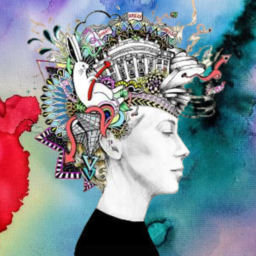
“Sometimes your joy is the source of your smile, but sometimes your smile can be the source of your joy.” —Thich Nhat Hanh
Smiling is one of human’s most powerful gestures. It’s a symbol that can be associated with our highest emotional content. Think of Mona Lisa; a painting that garners crowds and long lines at the Louvre in Paris daily because of her unique smile. The simple act of smiling can transform you and the world around you. It can act on your body and mind in a variety of positive ways, offering benefits for your health, your mood, and even the moods of people around you.
A concept presented over a century ago by Charles Darwin points out that smiles aren’t just visible signs of emotions but they also influence your mood. Darwin realized that the causes, consequences, and manifestations of smiling are universal, unlike other nonverbal body language behaviors. Babies begin smiling at five weeks old and quickly learn that crying gets attention, while smiling keeps attention.
Further substantiating the power of your smile, research from a variety of studies has proven that smiling people are more likely to gain others’ trust and cooperation, be promoted at work, make higher incomes, and have an overall better quality of life.
The Mona Lisa by Leonardo DaVinci
The Science of Smiling
Every time you smile, your body creates a cocktail of happy chemicals that result in a feel-good party in your brain. In recent research, scientists concluded that smiling can be as stimulating as receiving up to 16,000 Pounds Sterling in cash and is proven to give us the same happiness that exercising induces in terms of how our brain responds.1,2
For starters, smiling activates the release of neuropeptides, which are known to fight off stress. Neuropeptides are tiny molecules that allow neurons to communicate and facilitate messaging to the whole body when we are happy, sad, angry, depressed, or excited.
The feel-good neurotransmitters—dopamine, endorphins, and serotonin—are also released when a smile flashes across your face. This not only relaxes your body but can lower your heart rate and blood pressure.
Dopamine is a chemical in the brain that affects pleasure, motivation, and movement.
Scientists call dopamine the “teaching chemical” because it’s involved in the reward circuit of the brain. When you do something enjoyable, like smiling and laughing, your brain releases dopamine, causing you to feel good. The brain then remembers this experience and seeks it out again in the future.
When we smile, we flex certain muscles in our face. This movement tells our brain that we’re smiling which, in turn, initiates the release of endorphins. This is known as the facial feedback hypothesis — a theory that states that our facial expressions not only communicate how we feel to others but also to ourselves. The endorphins released when you smile also act as a natural pain reliever.
Finally, the serotonin release brought on by your smile serves as an anti-depressant and mood lifter. Many of today’s pharmaceutical anti-depressants influence the levels of serotonin in your brain, but with a smile, you don’t have to worry about negative side effects—and you don’t need a prescription from your doctor.
Smiling Can Facilitate A Better Quality of Life
When you smile, your brain is aware of the activity and keeps track of it. The more you smile, the more effective you are at breaking the brain’s natural tendency to think negatively. If you smile often enough, you end up rewiring your brain to make positive patterns more often than it does negative ones. The wellness benefits of smiling, though, doesn’t end there:
Smiling Reduces Stress
According to recent studies, smiling reduces the stress that your body and mind feel, while also helping to generate more positive emotions within you.3 That’s why we often feel happier around children – they smile more. Research shows that children smile an average of 400 times per day, compared to the average happy adult who smiles 40-50 times per day.
Chris Norris, a Psychiatrist, Neurologist, and Managing Editor at Sleep Standards, believes smiling to be the best stress-relieving technique. “Smiling when you’re happy or even if you’re sad helps you to deal with stressful times,” he mentions.4
A study conducted by psychological scientists at the University of Kansas found that “smiling during brief stressors can help to reduce the intensity of the body’s stress response, regardless of whether a person actually feels happy.”5
Smiling Strengthens the Immune System
With the onset of the COVID-19 pandemic, strengthening one’s immune system has been at the forefront of a lot of people’s minds. It’s commonly said that laughter is the best medicine and positivity allows for better and faster recovery, and there seems to be some truth to that. Laughter starts with a smile, and it’s been shown that laughter can increase immune-fighting antibodies, improving our response to illnesses.6
According to Dr. Lina Velikova, MD, Ph.D., and Medical Advisor at Supplements101, “Laughter and positive thinking increase immune response, allowing us to be less prone to diseases.” Humor can also raise levels of immune cells and boost infection-fighting antibodies.7
Smiling Reduces Pain
When we smile, our body releases endorphins which, as we mentioned above, are your body’s natural painkillers. Sarah Pressman, UCI professor of psychological science, helped conduct a study published in the journal of Emotion that took a look at different emotions and their impact on discomfort and pain.
They analyzed pain levels related to the injection of a needle — no bigger than one you may see when getting a typical flu shot. Pressman’s study found that those who were smiling during the injection reported the injection hurt about half as much as those who weren’t smiling, meaning that there’s a correlation between pain and the facial expression you convey. 8
Smiling Increases Endurance
Many scientists and doctors say that one of the most important factors in athletic endurance is perceived effort. Perceived effort is how hard you feel your body is working, regardless of how hard it might actually be working. It’s been proven that smiling can help in decreasing perceived effort and increase athletic performance.
One study found that runners used less energy in their workouts when they deliberately smiled through it. Many top athletes, including Olympic marathon gold medallist Eliud Kipchoge, for example, strategically use periodic smiling during running to relax and cope.9
Smiling Strengthens Relationships
Smiling can help you succeed in both your personal and professional life. Research suggests that those who express positive emotions and who are happier, in general, are more likely to achieve goals at work and in their everyday lives.
A study found that people who smile were perceived as “more likable” and can therefore form better relationships.10 Additionally, a study published in the Journal of Personality and Social Psychology reported that positive expressions like smiling predicted more “favorable outcomes” in life such as successful marriages and personal well-being.11
Smiling is Contagious
Did you know that your smile is contagious? The part of your brain that is responsible for smiling when you are happy or mimicking another’s smile resides in the cingulate cortex, an unconscious automatic response area.
We tend to mimic the smiles or frowns of others because it helps us better understand what other people are feeling, allowing us to respond appropriately.
Adrienne Wood, a Ph.D. student in psychology at the University of Wisconsin-Madison, mentions that “sensorimotor simulation” in our brains is what causes this mimicry to occur without us even realizing it.
When you see a facial expression and you want to know what it means, you recreate that expression in your brain,” Wood says. “In daily life, you rarely observe facial expressions in a vacuum, and we believe that you combine information from sensorimotor simulation with your understanding of the situation to fully comprehend other people’s feelings.”12
In a Swedish study, subjects were shown pictures of several emotions: joy, anger, fear, and surprise. When the picture of someone smiling was presented, the researchers asked the subjects to frown. Instead, they found that the facial expressions went directly to the imitation of what subjects were looking at.8
Essentially, each time you smile at a person, the person’s brain coaxes a return of the favor. You are creating a symbiotic relationship that allows both of you to release feel-good chemicals in your brains, activate reward centers, and increase the chances of you both living healthier lives.
Just Smile
“A smile is happiness you’ll find right under your nose.” —Tom Wilson
Our smiles have amazing superpower properties that can influence emotions in others and ourselves. When we’re overwhelmed with stress and anxiety, though, turning that frown upside down may seem impossible. There are plenty of ways you can practice using your smile to induce positive emotions in all areas of your life.
Try practicing gratitude in the morning; instead of checking your work email or snoozing your alarm every five minutes, count all the things you’re grateful for. You can do this while brushing your teeth, showering, or you can write it down in a gratitude journal.
Spending more time in nature can enhance your well-being, your mood, and your likelihood of smiling. Make it a habit to go on a short walk each day or enjoy your morning coffee outside.
A deep breath or two while enjoying nature can also cue the relaxation and mood-enhancing powers of smiling.
Doing good things for yourself and others is a rewarding way to boost your mood and your smile. Self-care is often overlooked but is just as beneficial as going out of your way to help others. Try doing a good thing for yourself and others daily.
Leave subtle reminders for yourself to smile more. It can be a magnet on your refrigerator, a note on your desk, or even an image on your phone background. Surround yourself with positive reminders to keep you smiling all day and eventually, it’ll become a healthy habit.
You can also take smiling to the next level by laughing. Laughing, much like smiling, creates an emotional state that relieves stress and lifts your mood. To laugh more, read jokes, watch comedy movies, and talk to funny people. Your laughter, much like your smile, is beautiful and deserves to be seen and heard.
The HBM Wants To See Your Smile
What made you happy this week?
What made you smile or laugh?
We want to share your happiness with you. Your well-being matters to us, and we’re always here to listen. The HBM is your home for feel-good, happy content that we hope causes you to beam with delight every day. Our main goal is for you to see the beauty inside you and your smile. We can’t wait to share a contagious smile and laugh with you.
—
Resources:
https://www.forbes.com/sites/ericsavitz/2011/03/22/the-untapped-power-of-smiling/?sh=570afd087a67 [1]
https://buffer.com/resources/why-exercising-makes-us-happier/ [2]
https://buffer.com/resources/how-much-sleep-do-we-really-need-to-work-productively/ [3]
https://sleepstandards.com/about/chris-norris/4 [4]
https://www.psychologicalscience.org/news/releases/smiling-facilitates-stress-recovery.html [5]
https://www.webmd.com/balance/features/give-your-body-boost-with-laughter#2 [6]
https://supplements101.net/author/lina/ [7]
https://www.cnn.com/2018/02/12/health/smile-running-energy-partner/index.html [9]
https://www.huffpost.com/entry/smiling-contagious-study_n_56c20ea2e4b0b40245c75650 [7]
https://pubmed.ncbi.nlm.nih.gov/12500783/ [8]
https://www.cnn.com/2018/02/12/health/smile-running-energy-partner/index.html [9]
https://pubmed.ncbi.nlm.nih.gov/24634058/ [10]
https://psycnet.apa.org/doiLanding?doi=10.1037%2F0022-3514.80.1.112 [11]
https://www.huffpost.com/entry/smiling-contagious-study_n_56c20ea2e4b0b40245c75650 [12]





















